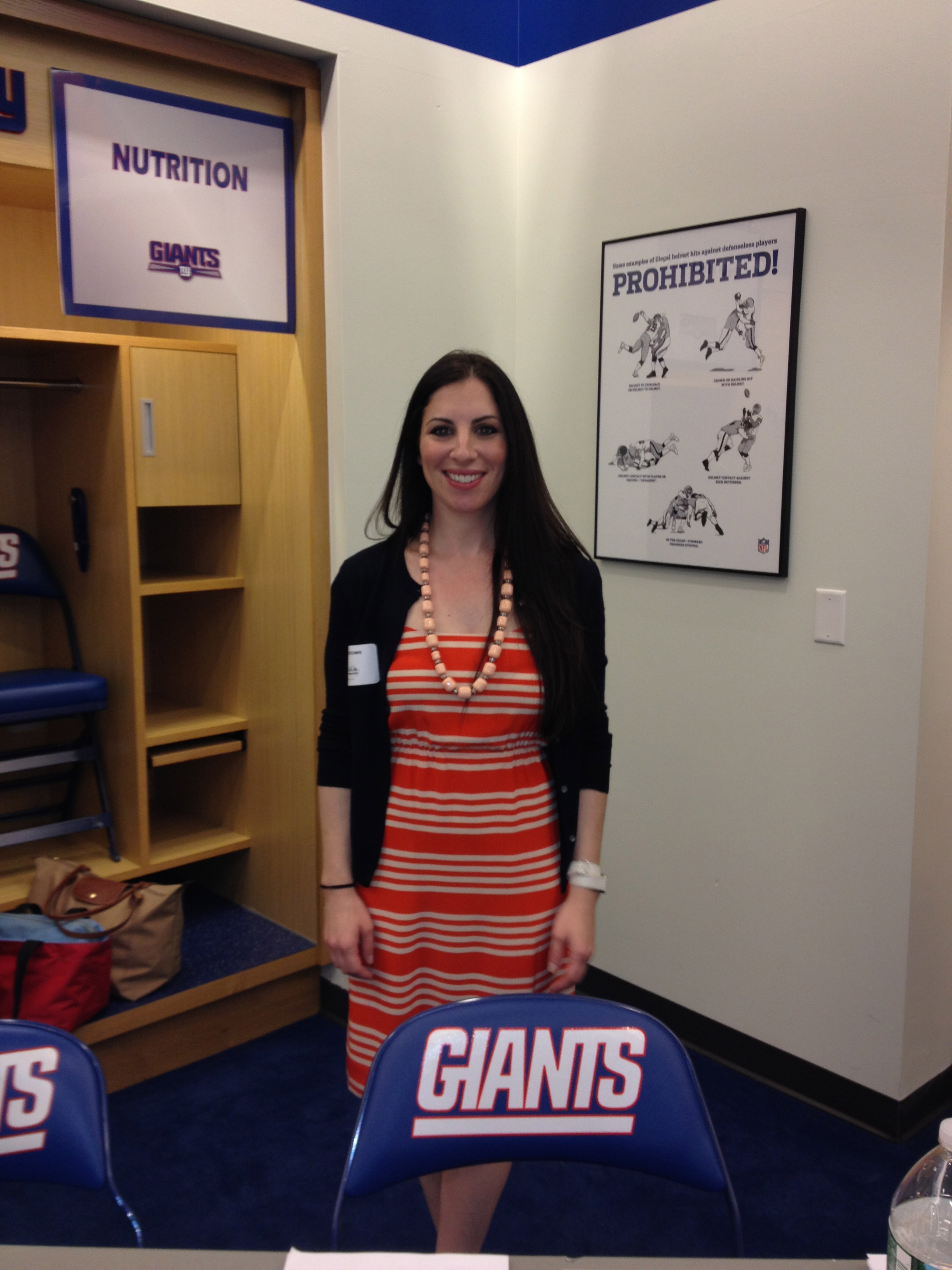FFG: Tara Ostrowe
Most people enter college with little to no idea of their major, let alone their desired career. Tara Ostrowe was an exception. She grew up a huge football fan, had an infinity for the New York Giants, and was planning to study nutrition. So at 18, she began her quest to become the nutritionist for the Giants, a job she eventually secured in 2010.
These days Ostrowe’s career plate is as balanced as one of her recommended meals. In addition to her duties with the Giants, Ostrowe is the nutritionist for the New York Red Bulls soccer team, works with the Columbia University Student Health Services and maintains a private practice.
I recently spoke with Ostrowe about her role with the Giants, athlete nutrition, and managed to elicit a few health tips for those of us who are not 350-pound professional football players.

How did you land the gig with the Giants?
I was brought on as a nutritional consultant for the Giants in 2010. I was already working with a few individual players and then whomever the coaches wanted me to see.
At start of 2011, they brought me on as official team nutritionist. At that point, I was working with all the players, staff, the whole team.
How does your job typically work with players? How involved are your nutritional plans?
First off, I’m at the facility on Thursdays. All the players can meet with me that day or they can text or email a any point.
When I first meet with someone I get a nutritional assessment of what they’re currently eating and their goals. Usually it has to do with an ideal body composition, whether it’s gaining muscle mass or losing body fat. Sometimes it’s general healthy eating and getting a structure to their day so they have a pattern. Because the guys need to keep up such a high caloric need it’s often hard for them to keep up structure. I calculate out what their needs are in terms of breaking it down into proteins, carbs and fat.
I usually don’t give them a specific calorie number, but I do base my plan on one. I’m more concerned about the ratio of proteins, carbs and fats for whatever the goal may be. And we’ll go over portioned out meals for the week and I provide a sample weeklong menu (Example: Breakfast post-lift, pre-practice, lunch, afternoon snack, dinner, evening snack.) For 5-7 days I’ll have meal ideas planned out based on foods they like and their needs. And I give them a bunch of options for each so they still have some flexibility.
While there are obvious disparities in size even within a position group, what is the ideal caloric intake for say, an offensive lineman vs. a cornerback vs. a linebacker?
[To answer this question Ostrowe did some calculations after our interview concluded and emailed the following results.]
The estimated needs for a NFL lineman are 5200 calories and 260g protein, for a NFL Cornerback is 3500 calories and 165 g protein, for a NFL linebacker is 4200 calories and 200g protein.
One thing I’ve noticed are player often exposing their dietary habit through social media. Some are proud to tweet pictures of the clean chicken breast and broccoli they made at home, while others brag about their runs to Popeye’s Chicken or Dunkin Donuts. What percentage of players do you think actually follow your advice?
You know, I feel like the majority of guys on the Giants do deeply care about their performance – this is their profession. Most of them seem pretty motivated the majority of the time to eat a pretty clean diet and will follow the nutritional goals that they know can make them the best player. I feel like over time more players are getting better about following a clean, healthy diet and following the goals they need to do. Because they’ve noticed that even small changes can really impact performance and recovery and decrease injury risk. It also helps that a lot more of the young players come from colleges with a sports nutritionist who are apart of the medical team; it’s already in their head in terms of overall health and wellness. So I think a lot of the young guys are coming to a team with more knowledge of nutrition.
Of course they’re going to have the special dinners and whatnot, but the majority of guys really what to do everything to be the best athlete they can be, at least the guys I work with.
Do any of the players’ wives and girlfriends try to utilize your services because I know I would in their position?
I work with quite a few of the guys’ girlfriends and wives, as it is open for them to meet with me as well. I’ve met quite a few over the time that I’ve been there and I even have a couple of the guys where I’ve talked to their families who are in a different state and had phone sessions. That could be for a dad they’re concerned with who had diabetes and heart disease.
But I do meet with a lot of wives and girlfriends whether it’s general health, to get their guy on track or wives that just had babies and want to get back in shape.
Arian Foster made waves when he briefly dabbled in veganism. Is it possible to be a professional athlete and a vegan?
I do work with quite a few vegan athletes and it is possible in some sports but I do think it’s extremely difficult for a football player. I don’t think it’s impossible at all but it would take a lot of dedication and planning. The protein needs are so high and it’s very difficult to get it from vegan sources And a lot of the guys are not into having any soy based products so it makes it difficult to get that much protein from beans and lentils if they’re not also going to be having the soy base.
There are some good products out there, like Vega and Vega Sport that make a really good protein powder. But again, the amount of protein that these guys need is so high, it could put them at injury risk. It could prevent them form gaining the muscle they need.
My personal take is that if you can be vegetarian vs. vegan it would be a lot easier. I do have a handful of guys on the team who are pescetarians meaning, they will only eat fish and not chicken, steak or pork. That’s very doable.
[I asked Tara if she could disclose which Giants are pescetarians. She cannot.]

(Ostrowe at her Giants practice facility station.)
Can you watch a certain player’s game and ascertain whether something dietary may be off based on his play?
I actually do watch the games very closely. In fact, I’ll tape them and watch them back. I’ll joke with some of the guys about how I watch the film, too, because I’m so into it. I’ll definitely notice if a guy looks a little sluggish. I don’t necessarily want to bring it up in a direct way but I may say, ‘how have you been feeling lately?’ or how has your energy been?’ I’ll have coaches tell me a guy seemed a little more tired during a meeting or less energized during practice and ask me to talk to them.
Sometimes when I talk with them, it comes down to them having had a cold that affected their performance. It also impacts their eating so we may go over immune health.
We’ve added a juicer now and have a fresh juice available each morning, as well as a bevy of smoothies including one for recovery based on immune system.
In closing, what are your most important health tips that apply to both athletes and the general public?
For general health and wellness, here are a few things I do think could be used for athletes or the general public.
1) Eating a clean diet. Eating the least processed foods, the whole foods. We all need to provide our bodies the proper vitamins and nutrients.
2) Trying to eat often. Listen to your body’s signals. Don’t ignore them. And really try to eat every 2-4 hours to keep your metabolism going, to keep your energy going and to keep your blood sugar levels in check. That could help with everything from performance on the field to energy in the classroom to focusing at work.
3) Being mindful of your portion sizes. Whereas a football player needs to be mindful that he’s getting enough food, enough protein, someone else may need to focus on having a proper serving size. Just make sure you’re giving your body what it needs. Oftentimes people eat and don’t really pay attention to what they’re having and it may be too much or not enough.
4) Try to make sure each meal and each snack have a balance of carbs, protein and fat. So whether it’s chicken or yogurt or some healthy nut. The fat could be in the form of peanut butter or some type of seeds, avocado or even adding olive oil to the meal.



